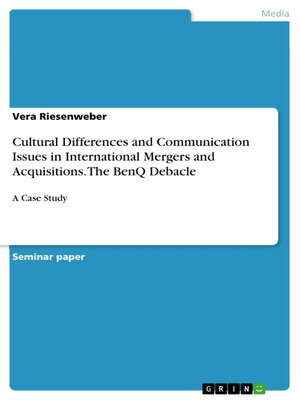Cultural Differences and Communication Issues in International Mergers and Acquisitions. the BenQ Debacle
ebook ∣ A Case Study
By Vera Riesenweber

Sign up to save your library
With an OverDrive account, you can save your favorite libraries for at-a-glance information about availability. Find out more about OverDrive accounts.
Find this title in Libby, the library reading app by OverDrive.



Search for a digital library with this title
Title found at these libraries:
| Library Name | Distance |
|---|---|
| Loading... |
Seminar paper from the year 2014 in the subject Communications - Intercultural Communication, grade: 1,0, Warsaw School of Economics, course: Global Management Practice, language: English, abstract: The number of global corporations has grown in the last few decades. The advent of technology and fliberalization of political and regulatory barriers enables companies to operate their business internationally. There are less moving barriers between different countries, more common worldwide laws, less barriers in monetary transaction and fewer geographic distances. However, very often companies fail in acquisition, foreign direct investments and cross-border partnerships because their global strategies are not proper enough, or the execution is more complex as expected.
This paper deals with BenQ's failure of acquiring of Siemens mobile devices. During the acquisition, parties face different challenges like market, technology and how to allocate budget, but in this case the biggest challenge was cultural interchange. This report analyzes cultural differences of both countries in which these companies are located based on Hofstede's cultural dimensions. This particular acquisition is an appropriate example of why some intercultural mergers don't work because of big differences in national, organizational and professional culture.







